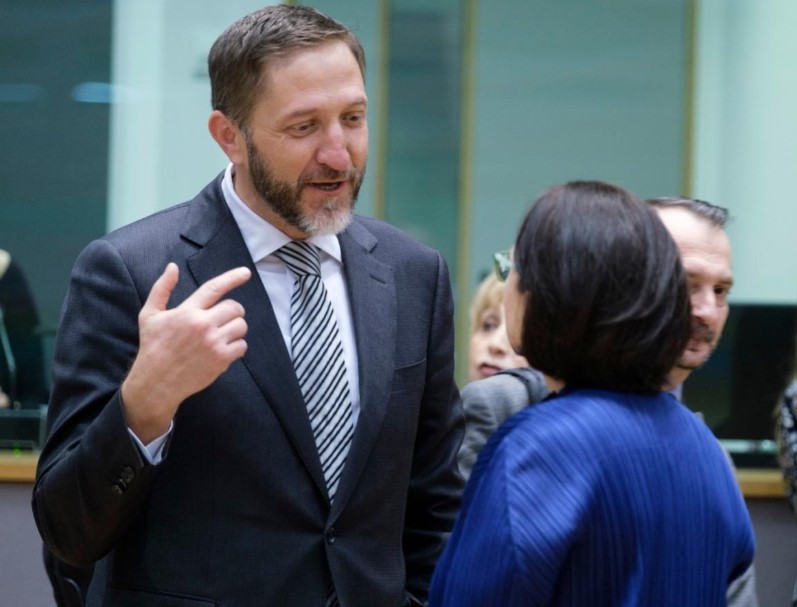By: Andrej Žitnik (Nova24tv)
As we know, the left-wing governments have traditionally been extremely bad at absorbing funds from the European Union. Whether this is a case of operational incompetence or, more importantly, a lack of dedication, since the potential for corruption with EU public funds is much lower, is a matter for debate. But the data show beyond doubt that this is one of the skills that left-wing governments simply do not have. If under the Janša government, we were extremely successful in absorption, we are now among the less successful European Union Member States. To this end, MEP Romana Tomc addressed a public letter to the Minister of Finance, Klemen Boštjančič, which we are publishing in its entirety below.
In 2021, Slovenia was performing very well in terms of the absorption of EU funds under the Janša government and was already four percentage points above the EU average, but then something went wrong under the new government. Official statistics from the European Commission show that Slovenia has not yet met any of the reform milestones that are among the conditions for funding the Recovery Plan.
Under the new government, things have quickly gone downhill
As early as mid-August 2022, the media already reported that Slovenia had fallen from 4th to 11th place among all EU Member States in the absorption of 2014-2020 European structural and investment funds (ESIF) in just four months – since April – and that Slovenia’s absorption was clearly lagging behind the EU average for the Cohesion Fund, which is mainly used to co-finance major infrastructure projects in the environment, transport and energy sectors. However, it was also evident that 2020 was the first year in the 2014-2020 programming period when Slovenia managed to break into the EU-27 average and was above average in the absorption of funds since then, the media outlet Slovenec wrote.
Why has Slovenia been so unsuccessful in absorbing EU funds under left-wing governments?
One of the key features of the Recovery and Resilience Fund is its performance-based nature, according to the ec.europa website. The RRF funds are disbursed when Member States have satisfactorily completed key steps in implementing the reforms and investments included in their Recovery and Resilience Plans. These key implementation steps are called milestones and targets. Milestones represent the qualitative, and targets the quantitative implementation step. The milestones and targets to be achieved by each Member State are set out in the Council Implementing Decision. For milestones and targets to be satisfactorily met, Member States have to complete the relevant reform and investment steps and send the relevant evidence to the European Commission, which then has to give the countries a positive assessment.
Romana Tomc has written a letter to Minister Boštjančič
As this is a topic of great importance for the country’s recovery from the Covid-19 pandemic, MEP Romana Tomc has written to Minister Klemen Boštjančič about the growing backlog of EU funds that Slovenia is experiencing under the new government. You can read her letter in its entirety below.
“Dear Minister Boštjančič,
In the European Parliament, we recently discussed the issue of the absorption of funds from the Recovery and Resilience Plan. Slovenia was singled out as one of the cases where implementation is far behind schedule. This is why there is a great fear in the European institutions that the plan will not be implemented in full, which would mean a huge loss of European funds.
According to my information, Slovenia was due to receive approximately 231 million euros as part of the pre-financing in September 2021. According to the plan, the first and second payment requests should have been sent together in the second quarter of 2022, but this did not happen. The third request was to be sent in the fourth quarter of 2022, which also did not happen. The first claim was only submitted in October 2022, much later than foreseen, while the second and third claims have not even been submitted yet.
The reasons for these delays are believed to be the non-achievement of targets or milestones. It is very frustrating that Slovenia is being treated as a problematic country in the debates. I trust that, as the responsible Minister, you will do everything in your power to ensure that there are no delays and that the funds available under the Recovery and Resilience Plan are not lost.
I would like to ask you, for the purposes of further discussions and explanations in the European Parliament, to please explain to me what the causes of the delays are.
Thank you for your explanations and best regards,
Romana Tomc”
When – or if – the Minister responds, we will also publish his or his Ministry’s response.
